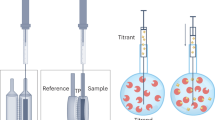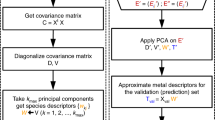Abstract
UNDER the title “Partition Isotherms and Gas-Liquid Chromatography,” Freeguard and Stock1 have reported that for all the systems studied by them, symmetrical elution peaks would be expected under normal gas-chromatographic conditions. Partition isotherms, however, when determined over partial pressures greater than those normally used in gas-chromatography, were found to be convex to the pressure axis.
This is a preview of subscription content, access via your institution
Access options
Subscribe to this journal
Receive 51 print issues and online access
$199.00 per year
only $3.90 per issue
Buy this article
- Purchase on Springer Link
- Instant access to full article PDF
Prices may be subject to local taxes which are calculated during checkout
Similar content being viewed by others
References
Freeguard, G. F., and Stock, R., Nature, 192, 257 (1961).
Gregg, S. J., and Stock, R., Gas Chromatography 1960, 90 edit. by Desty, D. H. (Butterworths, London, 1960).
Author information
Authors and Affiliations
Rights and permissions
About this article
Cite this article
SCOTT, C. Adsorption Isotherms and Linear Gas-Solid Chromatography. Nature 193, 159–160 (1962). https://doi.org/10.1038/193159a0
Issue Date:
DOI: https://doi.org/10.1038/193159a0
Comments
By submitting a comment you agree to abide by our Terms and Community Guidelines. If you find something abusive or that does not comply with our terms or guidelines please flag it as inappropriate.



